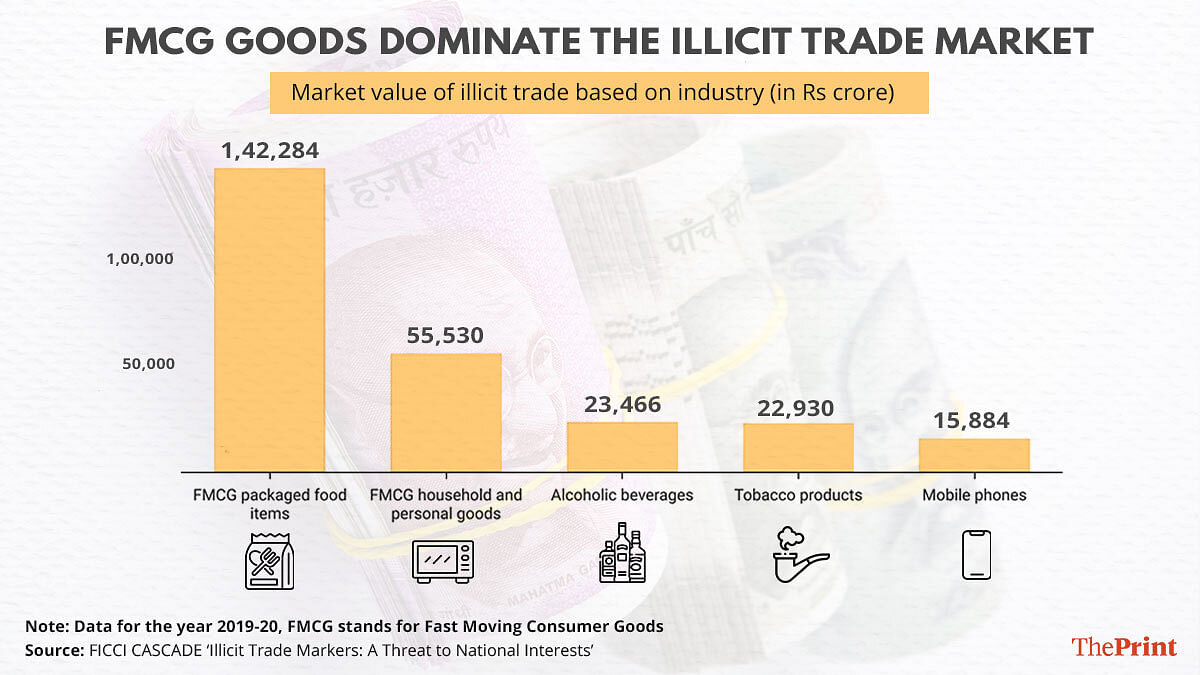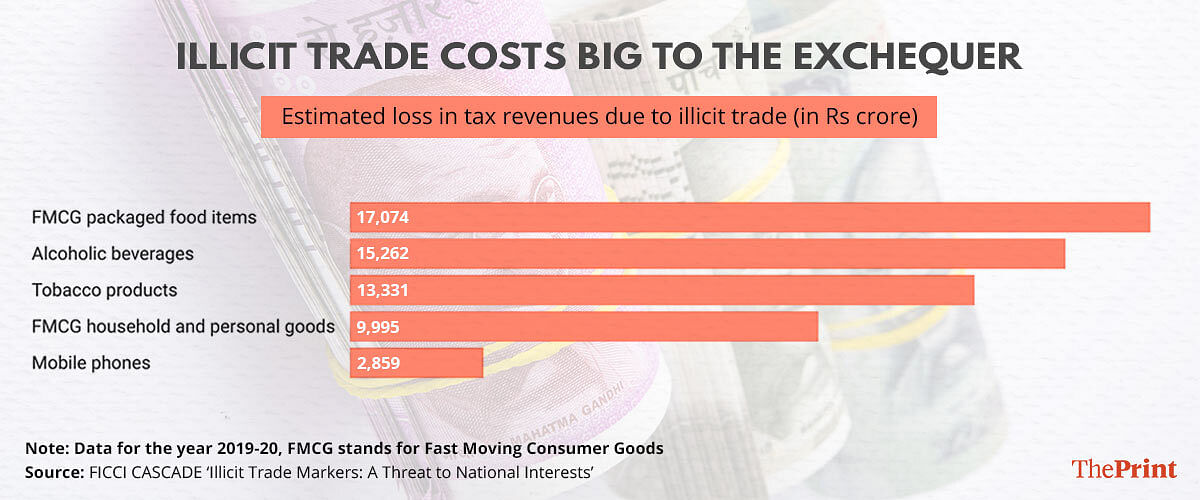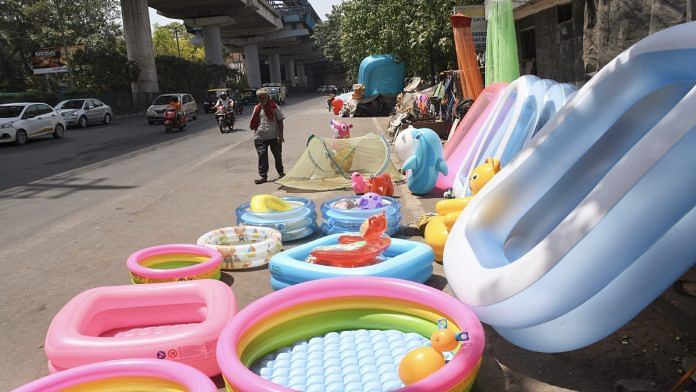New Delhi: Trade of illicit products in five key industries was valued at Rs 2.6 lakh crore for the financial year 2019-20, according to a report released by the Federation of Indian Chamber of Commerce and Industries (FICCI) on Thursday.
Overall, counterfeit goods cost a tax loss of Rs 58,521 crore to the exchequer.
The report, ‘Illicit Markets: A Threat for National Interests’, took up five key industries — mobile phones, alcoholic beverages, tobacco products, fast and moving consumer goods (FMCG) household and personal goods, and FMCG packaged foods — for the country-wide survey.
The research was conducted by Thought Arbitrage Research Institute, a Delhi-based think tank, for FICCI’s Committee Against Smuggling and Counterfeiting Activities Destroying the Economy (CASCADE).
Apart from valuation and tax loss, the report also calculates employment loss, and recommends possible steps for addressing the issue.
Also Read: India’s old age poverty will be big by 2050. Only 2% informal workers have invested in NPS
What is illicit trade? How is it calculated?
According to the report, an illicit market “covers all goods sold outside the authorised channels of trade. In addition, it may also include artisanal — home products produced outside the regulatory framework and the resale of expired products”.
The lack of data on organised matters makes valuation “extremely challenging”, but the authors relied on “demand and supply gaps”.
Their data sources include the Ministry of Statistics and Programme Implementation, the Private Final Consumption Expenditure, and the Directorate General of Commercial Intelligence under the Ministry of Commerce and Industry.
The research showed that in each of the five industries, consumers consumed more than what was supplied by the organised markets — hence, the remaining consumption was possible due to a supply of illicit goods. The share of illicit consumption was calculated by dividing the demand supply mismatch with the final consumption expenditure incurred on each product.
Also Read: Why don’t Indian fruit sellers make it big despite good profits? Imperfect competition, says study
Illicit trade dominates FMCG goods
Of the Rs 2.6 lakh crore illicit trade, about Rs 2 lakh crore was reported in the FMCG sector.
The illicit trade in FMCG packaged food items (like confectionery, dairy products, non-alcoholic beverages) was Rs 1.42 lakh crore. The authors estimated that this amount accounts for about 25 per cent of the market.
The illicit trade value in the FMCG household and personal goods (skin care, oral hygiene, hair care, fabric care, etc) was valued at Rs 55,530 crore, which is lower than the packaged FMCG goods. However, in terms of market capture, these illicit goods captured about 34.25 per cent of the market share — the largest among the five surveyed industries.
Illicit trade of alcoholic beverages was valued at Rs 23,466 crore, followed by illicit tobacco products Rs 22,930 crore and mobile phones Rs 15,884 crore.

The reason why FMCG (household and personal) tops the charts in terms of market share is because branded products charge a higher price, the report said.
“Established brands and premium products are often the biggest sufferers as look-alikes are available at cheaper prices and passed off as original often by misspelling, etc of the trademark,” it said.
Similarly, for FMCG (packaged foods), the report said the non-requirement of industrial licence for agro- or food-based micro and small industries could be one of the factors behind counterfeiting products.
“Counterfeit products are mostly produced in unregulated markets and by low-paid workers; low IPR (intellectual property rights) requirements and inadequate enforcement mechanisms coupled with large informal markets further lead to an increase in the illicit market,” the report said.
According to the report, a total of 15.96 lakh employment opportunities were lost due to illicit trade of which about 11 lakh were in the FMCG sector alone. These numbers were calculated using the input-output model developed by Nobel economics laureate Wassily Leontief.
Using the same model, the authors were able to calculate how much more revenue (in taxes) the government could have earned had the illicit trade come under formal channels — Rs 58,521 crore for the year 2019-20.

The way ahead
The report also recommends various policy steps needed in multiple directions to curb illicit trade.
From strengthening the domestic manufacturing sector, rationalising tariffs to reducing tax arbitrage, police monitoring and stronger punishments, the authors suggest a ten-point agenda in its “way ahead” chapter.
“To instil a fear of the law in the minds of criminals, it is essential to not only pursue them doggedly but to ensure that the system does not allow them to go free without adequate punishment,” the report said.
“Strong cooperation between different stakeholders and innovative action is required to free India of illicit trade. Smuggling and counterfeiting is all-pervasive and industry, government and society directly bear its brunt,” FICCI president Sanjiv Mehta said.
(Edited by Theres Sudeep)
Also Read: When will India become an upper-middle-income country like China? Unlikely for 25 yrs



